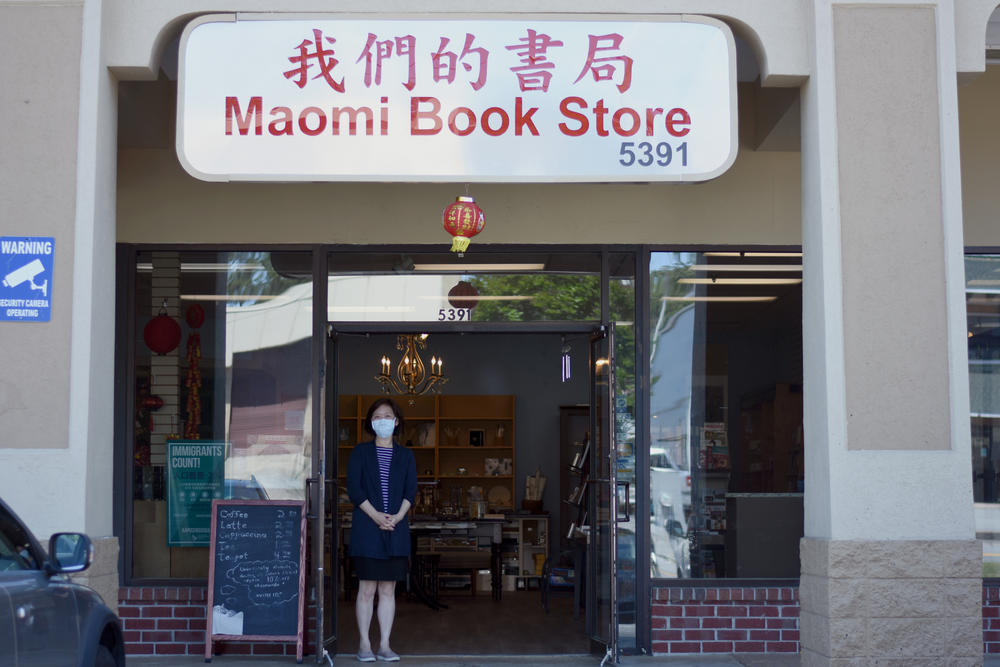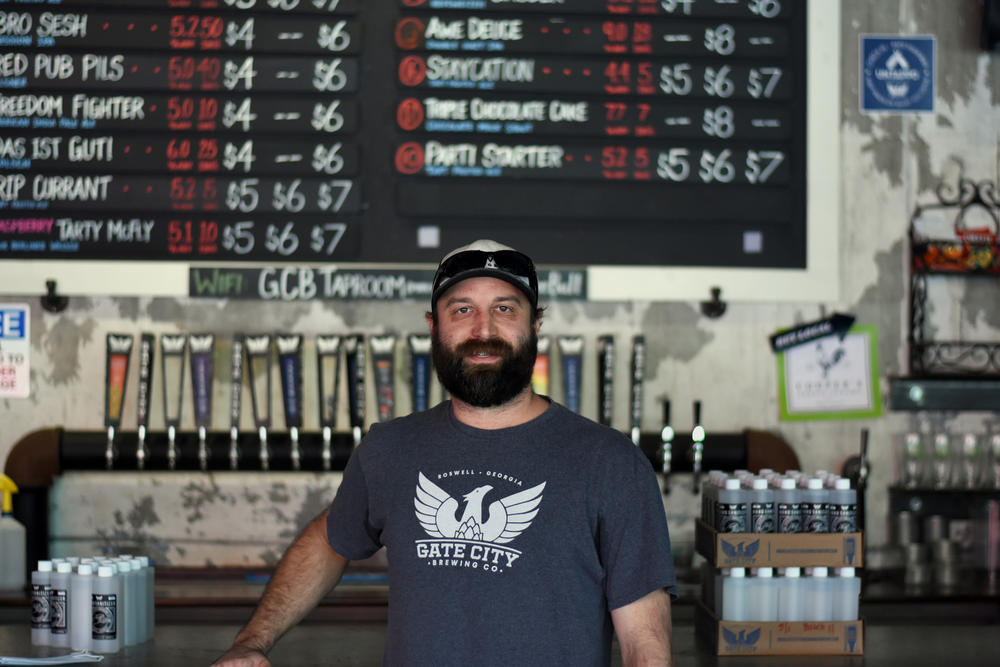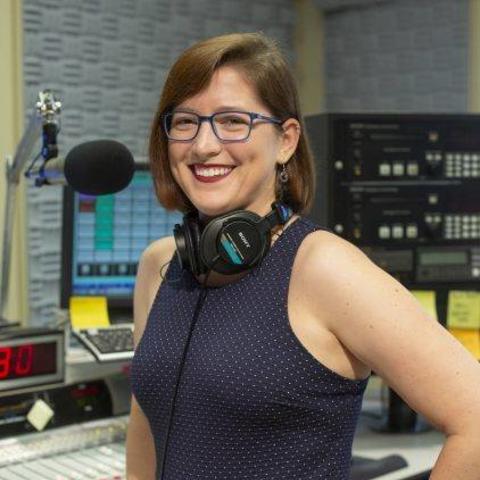Section Branding
Header Content
Small Business Owners In Georgia Open Their Doors To A Great Unknown
Primary Content
In the week since Georgia’s shelter-in-place order ended for most, businesses have started to open back up. But with new rules and wary customers, many small businesses are still finding their feet.
GPB News reporters fanned out across the state to ask small business owners how their reopening process changes the way they operate.
Cafeterias like the S&S Restaurants in Macon were common decades ago, less so now. And so S&S CEO Rick Pogue says his customers skew a little older.
"We have a lot of people that depend on us to eat here every day that have for years and years and years,” Pogue said.
Those are the regulars. And Pogue said even though S&S never stopped takeout orders while Gov. Brian Kemp’s shelter in place order was in effect, the regulars have been clamoring to dine in.
"Phones are ringing off the hook. ‘Are you open? Are you open?,’” Pogue said. “Our main concern was, is that we do everything for the safety of our employees and our guests."
Rick Pogue says there are new safety measures at S&S. There’s Plexiglas between customers and staff where there weren’t already sneeze guards. All staff have masks, gloves and adhere to a handwashing schedule. Two-thirds of the normal table space is gone.
To top it off, the tree covered with suckers on the way to cash register, a favorite of generations of kids, is nowhere to be seen.
"Now if children come in, we will give them a sucker,” Pogue said. “We just don’t have the tree up there. Anything related to self-service, it’s out of the dining room.”
He said S&S exceeded the 39-point sanitation plan provided by the state.
But on a day Pogue said there would normally be a bustling lunch crowd, only four or so tables were full. Still, for the few regulars there, it was a familiar place to let their masks down.
“As long as safety precautions are in effect, we feel like we're providing a safe environment,” Pogue said.
And that’s apparently keeping some of the regulars happy. One customer gave Pogue her muffled thanks as much on her way out the door and after pulling her mask back up.
"Oh, it was so good!” she enthused.
Susanne Warnekros owns Ghost Town Tattoo and The Jinx bar, both in downtown Savannah where rents aren’t cheap. And Ghost Town just expanded into a bigger space, adding to the financial pressure.
“It’s a hell of a time to own a bar and a tattoo shop,” Warnekros joked.
The bar remains closed under state orders, while the tattoo parlor has reopened for appointments but not walk-ins.
Everyone, artist and client alike, has to wear a mask and have their temperature checked. And all the work is one-on-one, meaning no friends to hold your hand or bachelorette parties coming in as a group.
“It’s always a very hygienic, you know, sterile environment anyway,” she said of tattooing. “But yeah, we’ve amped it up a little bit with just being extra extra careful.”
Warnekros thinks Kemp jumped the gun on allowing tattoo parlors to operate again, but she’s grateful they’ve been able to do some business, albeit in a different way.
“It’s paying our bills. We need it. We haven’t gotten any real government assistance,” she said.
Her bar was turned down for a federal loan. She believes the tattoo parlor will get one, but is frustrated by what she said is a lack of communication. But, she said, at least local businesses are helping each other out.
“It’s really been a great support system to, you know, talk to the other bar owners that I’m friends with because we just collectively share information,” Warnekros said. “Because there’s no, like, one direct source to go to with all of these questions.”
Warnekros said she thinks her businesses can survive. But the future is uncertain for her and everyone in these industries, particularly for live music venues like the Jinx. Bands may be leery of traveling in the close quarters of a tour bus, she said, or unable to book tours when they can’t be sure a venue will still be open in six months.
“It’s gonna be really interesting to see what the landscape is like a few months from now. You know? Like, not everybody’s gonna make it through this,” she said.
Just off of Buford Highway in Chamblee, the Chinatown Mall is a ghost town. The normally-bustling corridor of shops and restaurants sits mostly empty, save the sounds of leaf blowers and chimes tinkling in the doorway of Maomi Bookstore.
Over a cup of Oolong tea, owner Yvonne Hou explains why the specialty shop opened up May 1.
“We need the revenue,” she said. “That’s the main thing.”
Manager Willow Chen said that Maomi is more than just a bookstore for members of the community, so closing nearly two months ago was especially hard.
“We rely a lot on our regulars: people that come in solely for newspapers, or people that come in for their monthly re-up of their favorite tea, or their favorite coffee, or just to sit down and have a break from the stresses of life,” she said.
There are also community events, calligraphy workshops and other in-person interactions that can’t be done online.
And there are bills to be paid. Chen said even the unique position of being the only Chinese bookstore in the southeast hasn’t guaranteed a return to normalcy.
“Our online sales presence isn't huge, so what we rely on is foot traffic,” Chen said. “And as you can see, even though we've opened we're not getting a lot of traffic.”
Gate City Brewing in Roswell has gone from a normally-filled taproom to filling jugs of hand sanitizer for local hospitals and businesses trying to reopen under a long list of health and safety precautions.
They are still selling beer to-go, and a few locals sit at socially-distanced patio tables to enjoy drinks, but co-founder Pat Rains says his business is built around people coming together in close proximity – something that probably won’t happen any time soon.
“The reality is that none of us are sure what the future looks like,” he said. “And I think that's the hardest part is the unknown.”
While the brewery was able to secure a loan from the federal government and the pivot to hand sanitizer has proven popular, Rains said it has been a struggle to make ends meet.
Gate City is one of many small businesses that line Roswell’s downtown strip, and Rains worries about what will happen to his fellow small business owners across the state in the coming weeks.
“Small businesses make up such a huge part of each individual community, and those are the people that I think kind of make up what a community is,” he said. “So to me, supporting small business is a way forward… it’s providing people and their families with jobs, and it’s supporting your own city and the people in it.”





